“In terms of engaging and influencing your team, especially in a virtual environment, how you say something, or your vocal quality, can sometimes be more important than what you say.” – Hassan Osman
What is Remote Team Collaboration?
Remote team collaboration is the ability to work together from different locations using digital collaboration tools. It allows team members to communicate and achieve common goals regardless of their physical distance.
Remote collaboration has become increasingly important in today's workplace, especially with the rise of remote work due to the COVID-19 pandemic. While it comes with its own set of challenges, such as communication barriers and lack of visibility, remote collaboration can also lead to more productive meetings, engaged employees, and improved flexibility.
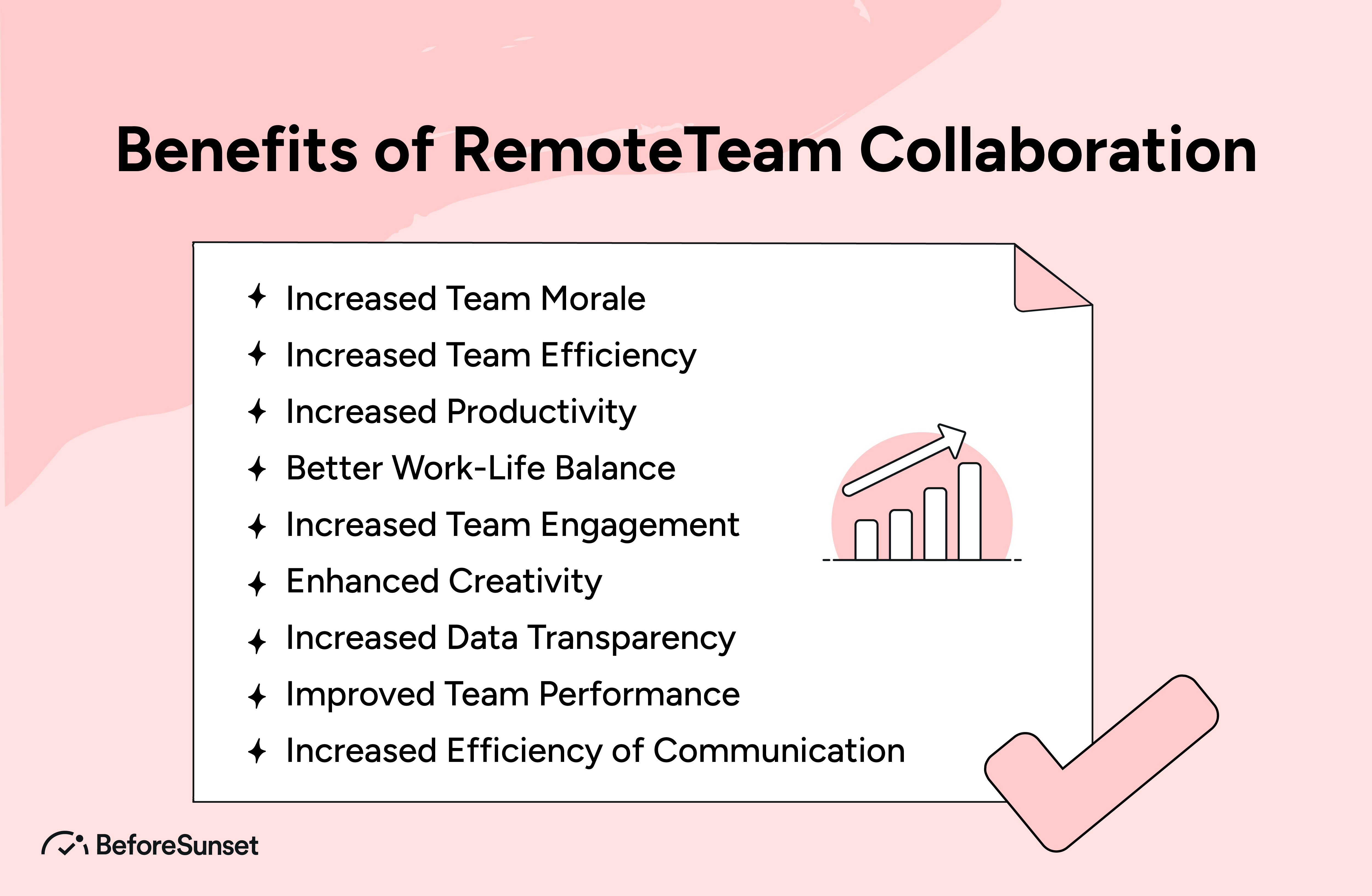
You may also like:
"Teamwork Makes the Dream Work": The Meaning and Importance of Teamwork in the Workplace
How to Foster Successful Team Collaboration: Definition and Its Benefits
Benefits of Remote Team Collaboration
1. Increased Team Morale
Remote team collaboration can significantly increase team morale by fostering a sense of trust, transparency, and connection among team members. When remote teams work together effectively, employees feel more valued and supported, leading to a more positive work environment.
This can be achieved through:
regular video meetings,
group brainstorming sessions,
and sharing updates across departments.
Additionally, when employees see the impact of their work on the overall success of the organization, they are more motivated to contribute to the team's goals. By creating a culture of transparency and open communication, remote team collaboration can be improved and that makes it possible for us to see an increase in job satisfaction, and that ultimately boosts team morale.
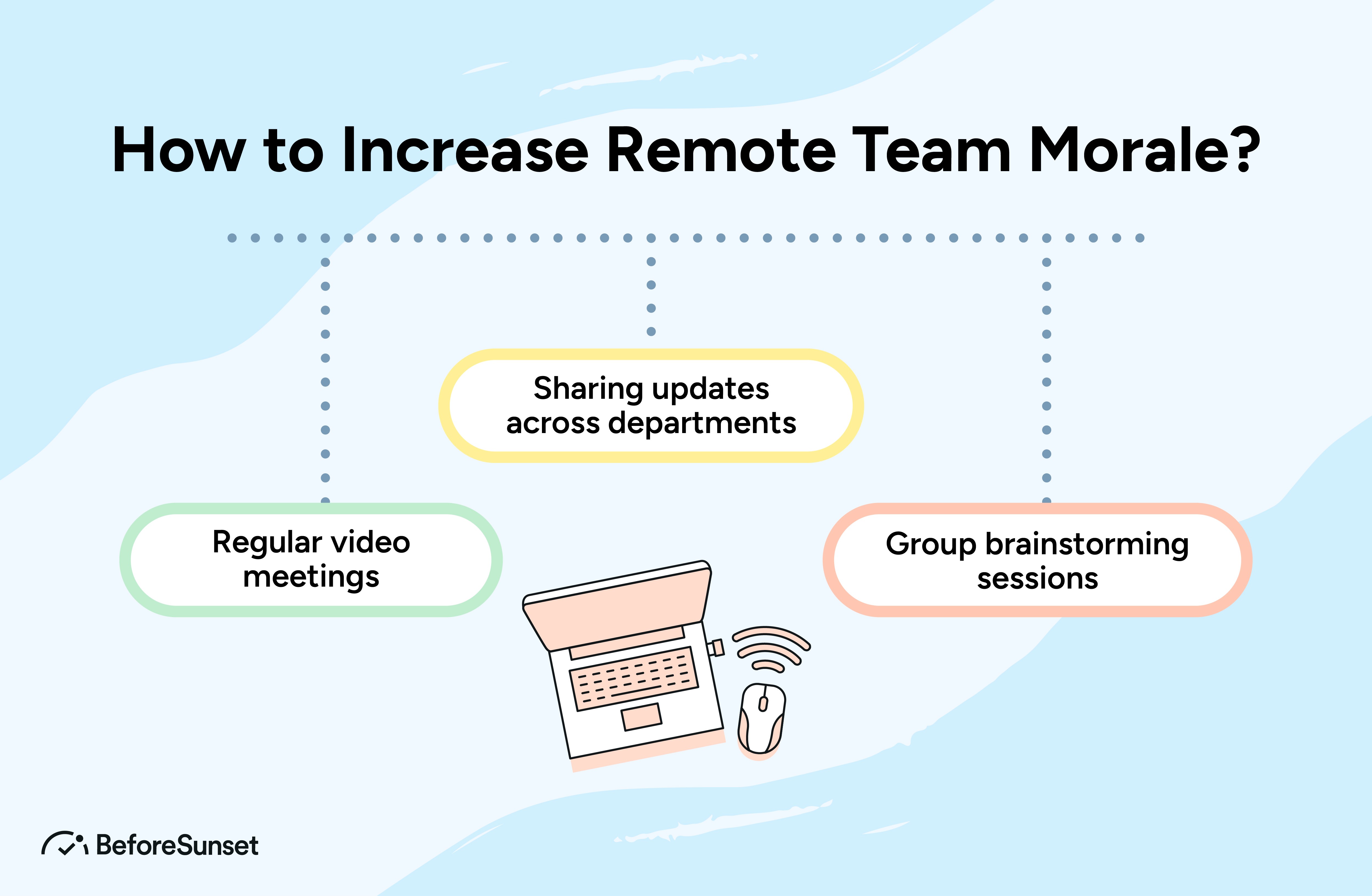
2. Increased Team Efficiency
Remote team collaboration offers several benefits that can increase team efficiency. With the help of digital tools, remote teams can improve communication, increase productivity, and boost accountability.
For instance, virtual teams can utilize video conferencing and chat options to stay connected and collaborate effortlessly, making it easier to stay in touch with colleagues and maintain their involvement in the overall process.
Moreover, remote teams can benefit from powerful features such as virtual whiteboards, file sharing, and brainstorming tools that facilitate idea generation and knowledge sharing among team members.
Additionally, remote teams can stay organized with tools that provide an easy way to track time and request personal days, which in turn, helps to increase accountability.

9. Improved Team Performance
Remote team collaboration can significantly improve team performance by enhancing team synergy and adaptability. Improved collaboration skills lead to better organizational flexibility and the ability to cater to customers' preferences more effectively.
When remote team collaboration is improved while maintaining a value-based culture, employees' stress levels and toxic health conditions drop significantly, leading to a healthier workforce and retention of top talent.
What Are The Benefits of Remote Ream Collaboration? TL;DR
Benefits of remote team collaboration include:
Improved communication through remote working tools, promoting teamwork and idea sharing.
Increased productivity through features such as file sharing and virtual whiteboards.
Enhanced accountability with time tracking and personal day requests.
Access to top talent regardless of location.
Accommodation of different schedules and work styles.
Elimination of commute times for increased flexibility and freedom.
Reduction of office space and equipment needs.
Organizational flexibility, healthier workforce, innovation, retention of top talent, clear communication, increased productivity, and profitability.
Better ability to adapt to changes and cater to customer preferences.
What Are The Challenges of Remote Team Collaboration?
Remote team collaboration poses several challenges that can hinder productivity and innovation.
The lack of face-to-face interaction: One of the main challenges is the lack of face-to-face interaction, which makes it difficult to read body language and interpret messages accurately. This can lead to misunderstandings, anxiety, and conflict among team members.
The difficulty in brainstorming: Another challenge is the difficulty in brainstorming and bouncing ideas off each other informally, as remote teams may not have the same opportunities for spontaneous collaboration as in-person teams.
The absence of spontaneous and informal interactions that occur naturally in an in-person setting: Remote teams often struggle to replicate the impromptu brainstorming sessions and idea-sharing moments that arise when colleagues work side by side. The lack of these organic exchanges can limit the flow of creative ideas and hinder the collaborative process.
The absence of physical proximity: It makes it harder for team members to establish a sense of camaraderie and trust, leading to potential delays in decision-making and reduced cohesion within the team.
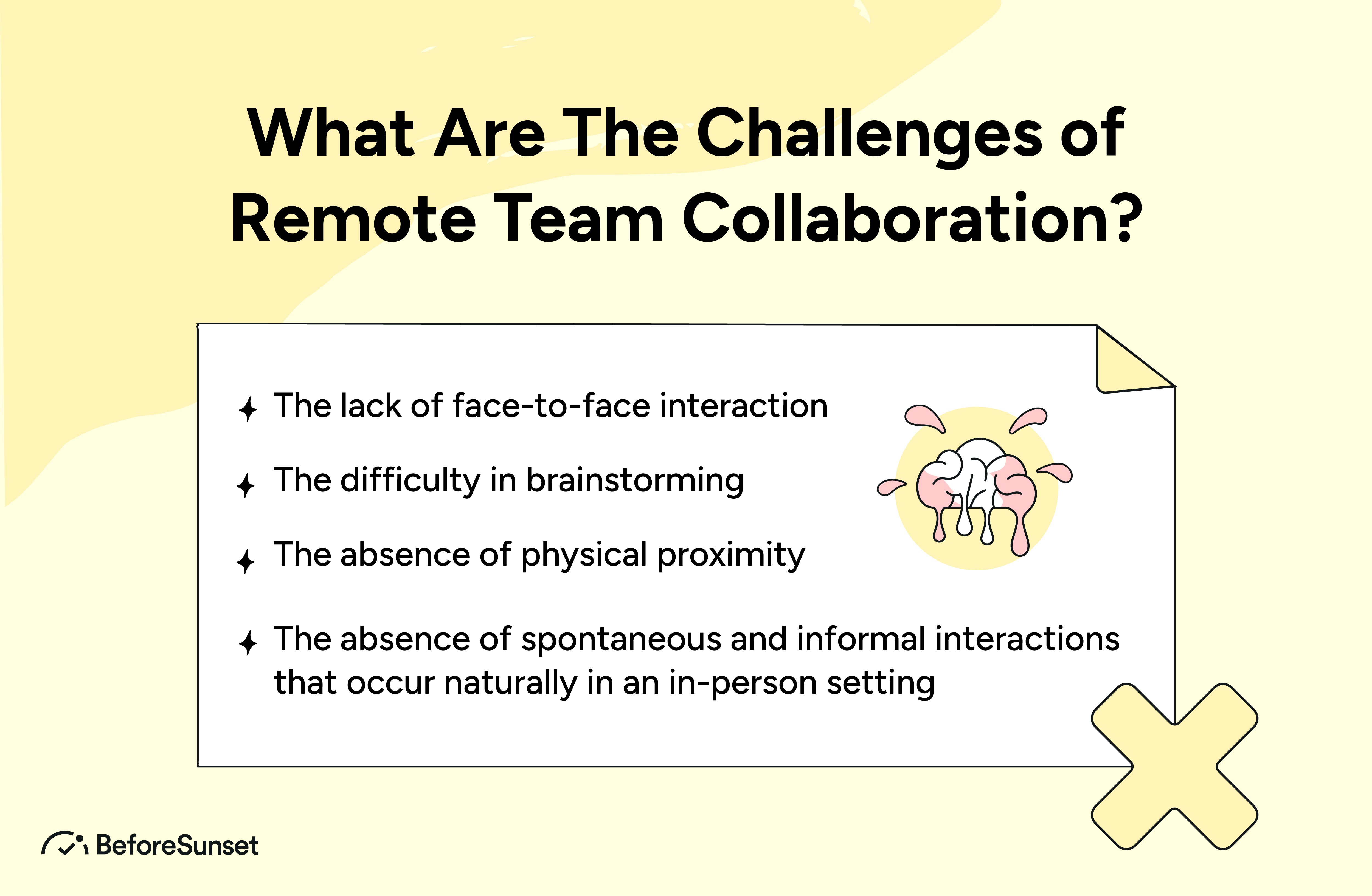
Strategies to Master Teamwork Without Being in The Same Place
1. Use Team Chat Platforms
Using team chat platforms can greatly enhance collaboration among remote teams. By setting up different channels for specific topics, team members can easily find and engage in relevant discussions.
Popular team chat platforms such as Slack and Microsoft Teams offer features like threaded conversations, file sharing, and integration with other productivity tools. Video calls can also be used to improve communication and strengthen connections between team members.
2. Establish Team Building Rituals
Establishing team-building rituals for remote teams is crucial to promote collaboration and improve communication. These activities can help build strong team dynamics and foster a positive work culture.
Virtual team-building activities can be as simple as hosting monthly virtual lunches, conducting virtual home or office tours, or even celebrating birthdays and promotions. It is important to encourage non-work-related banter and facilitate open discussions to enable the team to bond.
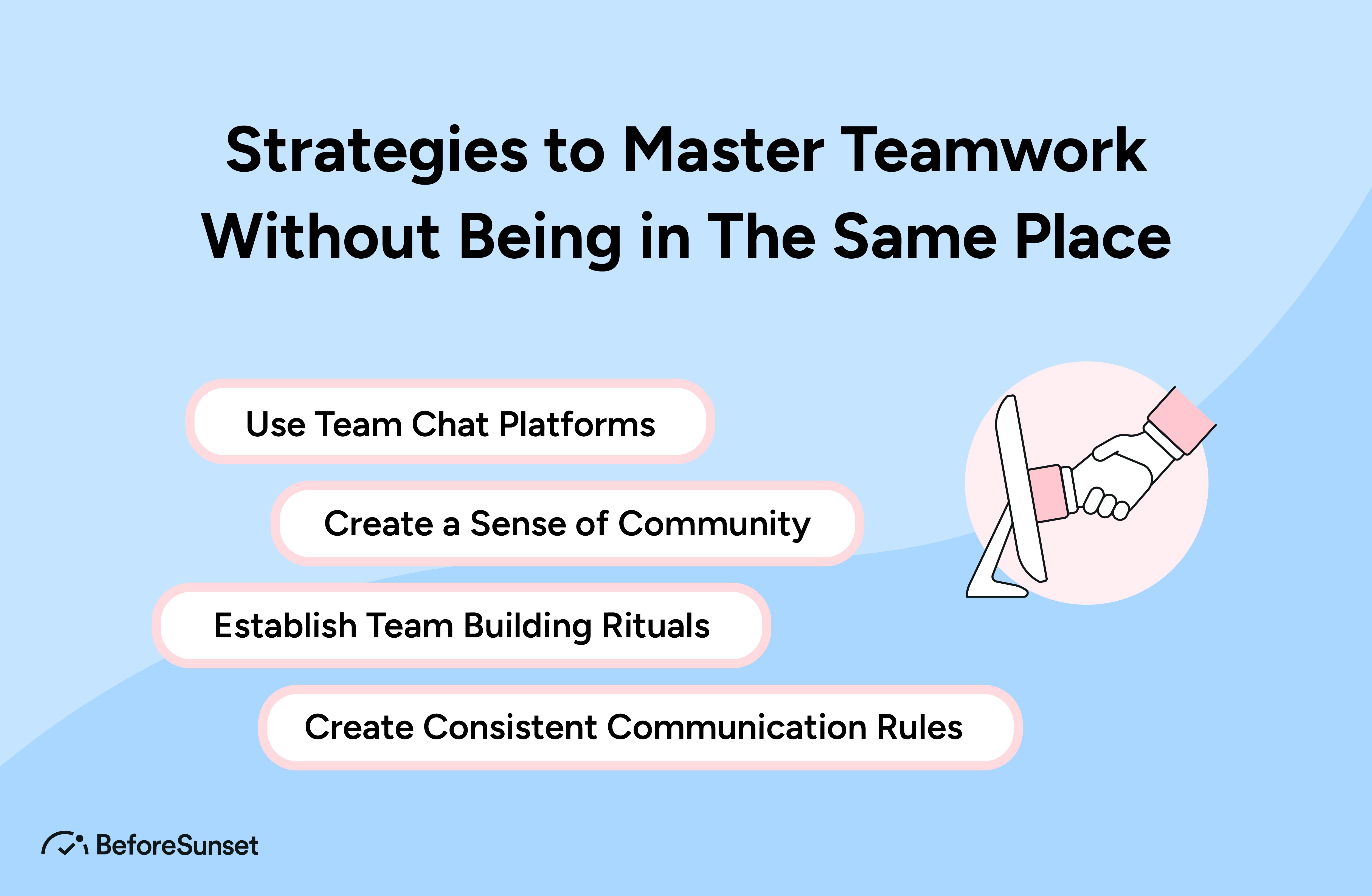
3. Create a Sense of Community
Working remotely can be isolating and can make team members feel disconnected from each other. However, there are strategies and tools that can be used to create a sense of community among remote teams.
Firstly, it is important to foster a culture of collaboration and support. Leaders should prioritize supporting their team members and ensure that communication flows freely. This can be achieved through video chats, group chats, or calls. It is also important to celebrate milestones and events, such as birthdays or promotions, through digital celebrations.
Another effective strategy is to encourage personal relationships among team members. HR leaders and managers can give team members time and space to build personal connections. Virtual spaces can be created for shared rituals such as book clubs or happy hours. Social events and celebrations can be planned by volunteers and held virtually. This enables team members to bond and creates opportunities for professional collaboration.
Transparency is also essential for promoting a sense of community among remote teams. Information should be shared appropriately with remote teams to ensure that they feel valued and part of the team. Video meetings can be held for significant updates, and team leaders can send emails with updates at the end of the day.
4. Create Consistent Communication Rules
Creating consistent communication rules for remote team collaboration is crucial for ensuring efficient and effective communication. Start by establishing which communication tools your team will use and when to use them. Determine guidelines on when to send messages and expect responses. It’s also important to establish clear boundaries on communication outside of work hours and respect team members’ time and privacy.
For better collaboration, teams should establish norms and expectations for communication, such as being clear and concise in messages, avoiding bombarding others with unnecessary information, and using project management tools to maintain workflow. Creating a company-wide dictionary of a common language can also help ensure everyone is on the same page.
Consistent communication rules can help remote teams collaborate better by reducing confusion, saving time and energy, and enhancing productivity. By having clear communication guidelines, remote teams can ensure that everyone is aligned, working efficiently, and achieving goals.
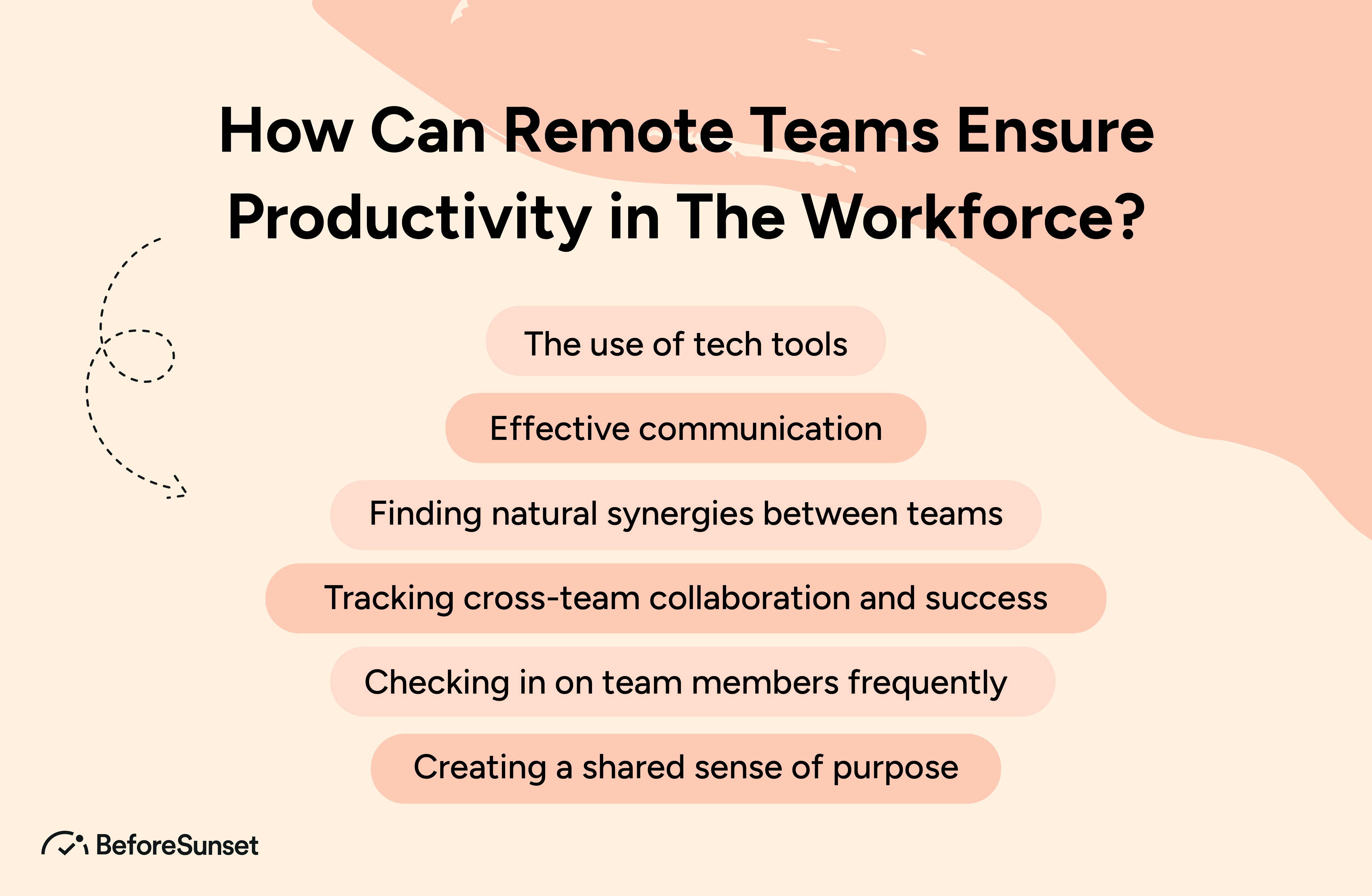
How Can Remote Teams Ensure Productivity in The Workforce?
Remote teams can ensure productivity by utilizing various strategies such as:
effective communication,
the use of tech tools,
finding natural synergies between teams,
tracking cross-team collaboration and success,
checking in on team members frequently,
and creating a shared sense of purpose.
Communication is essential to keep team members connected and engaged, whether through video conferencing or chat tools. Tech tools such as file sharing, virtual whiteboards, and brainstorming tools can help maximize productivity and efficiency.
It is also crucial to track team progress and hold each other accountable through tools that provide an easy way to track time and request personal days.
Finally, creating a shared sense of purpose and bonding between team members can help maintain motivation and collaboration. By implementing these strategies, remote teams can work effectively and productively from different locations.
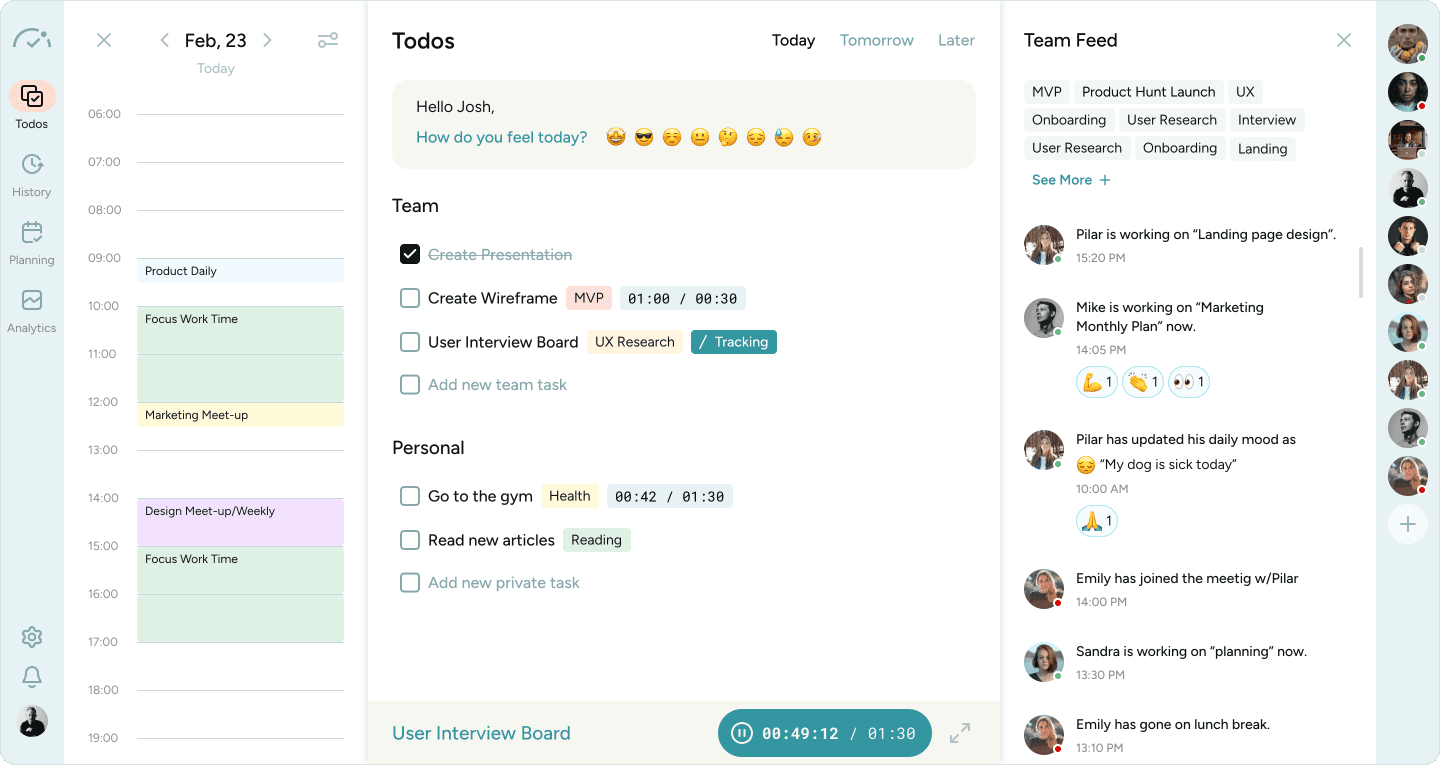
How Can Virtual Teams Stay Connected While Working Remotely With BeforeSunset AI?
With the upcoming feature of BeforeSunset AI, you and your team will be able to:
Share your progress easily so you can let your teammates know what you're up to.
See real-time updates from your team so you don't have to ask your teammate if they're available.
Know your team's mood so you can get a heads-up about who not to mess with for your own safety.
Set your location so you can learn who's at the office today for an office party.
Find out who's listening to what so you can get to know your teammates' musical tastes.
Get to know your teammates so you can learn their hobbies, pet names, favorite desserts, and birthdays.
Analyze team analytics so you can improve the team's collective performance, identifying areas where they are excelling or struggling.
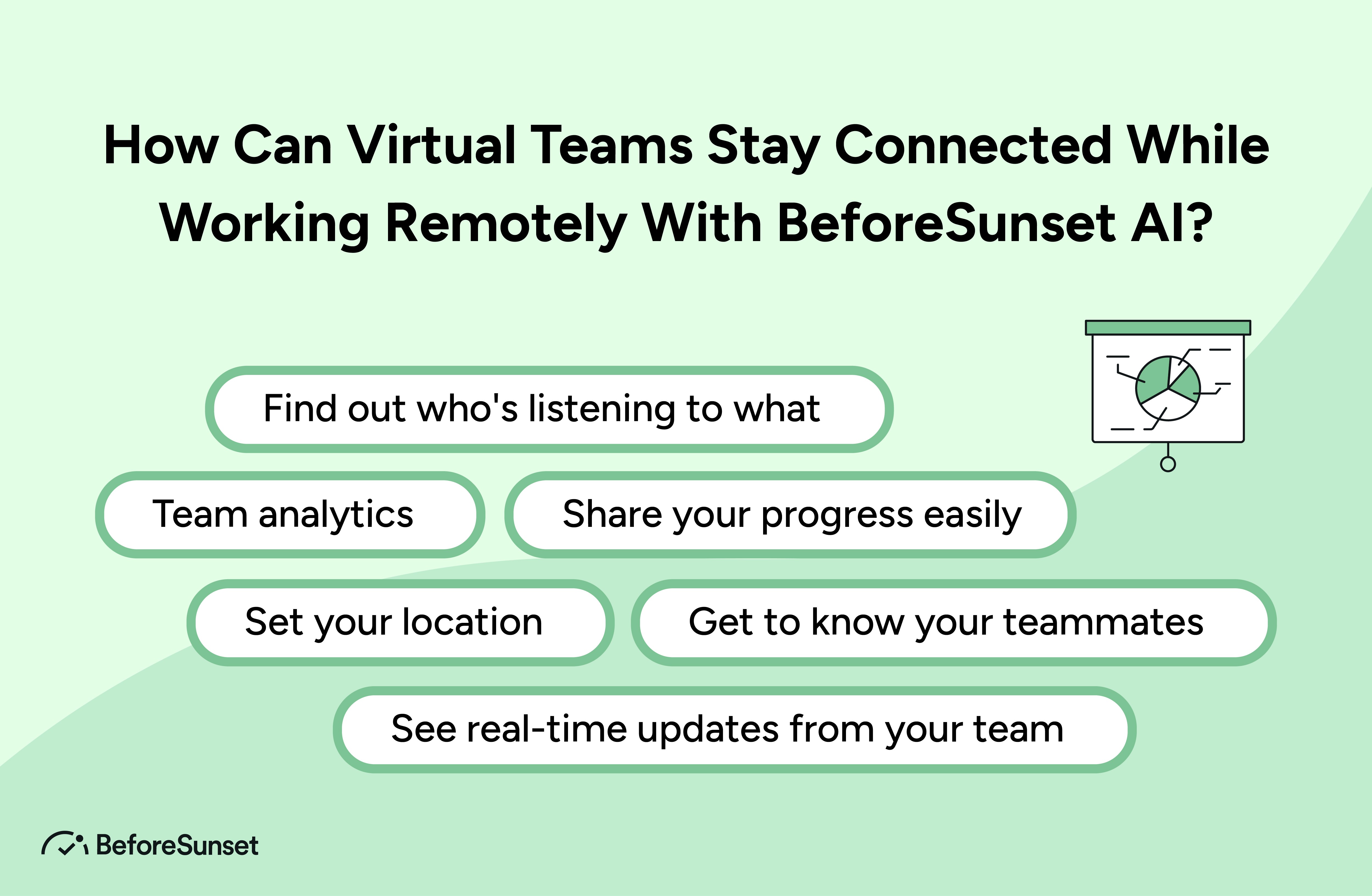
Sign up now so you can learn when the team version becomes available for you and your team to enjoy!


